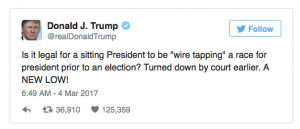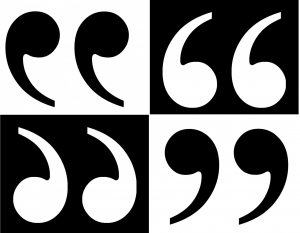You don’t see many news stories about punctuation marks! But the Huffington Post just published an article about the unconventional ways that President Trump uses quotation marks (“”) in his Tweets.
Questions about quotation marks started flying when a recent Presidential Tweet alleged that the Obama White House was “wire tapping” the Trump campaign. When reporters pressed for evidence, the White House pointed to the quotation marks and explained that the Tweet wasn’t really about wiretapping – it was about surveillance.
But that only created more confusion, because other Presidential Tweets frequently used quotation marks for emphasis – when discussing “big stuff” or a “bad” situation, for example. And a linguistics expert who studied a series of recent Tweets noticed that sometimes the President seemed to be trying to tag words and expressions that he doesn’t use very often. For example, “carnage” had quotation marks in one recent Tweet.
I’m not a political insider, so I’m not going to try to offer any interpretations about what the Tweets might mean – or not mean. What I want to do here is plead for clarity.
Clear communication should always be a writer’s top priority. That means you shouldn’t use unconventional punctuation (such as ?!) that might confuse readers.
And you shouldn’t use words loosely or ironically. Let me give you a common-sense example. Young children sometimes don’t understand figurative language. So if your five-year-old is helping you put glassware onto the dinner table, don’t say “Drop what you’re doing and look at this, Susie!”
Crash. Tinkle. Shattered glass everywhere.
Quotation marks properly mean that you’re quoting someone’s exact words, and they’re used for titles of poems and short stories – and that’s about it. But – alas – many writers think quotation marks are cute – or a handy way to call attention to a word – or a signal that a word is being used in an unusual way.
Serious writers never use quotation marks in those ways, and you shouldn’t either.
I hope you’ll bear with me while I give you a non-political example that makes the same point. Some of you know that I often help police officers with their paperwork. Here’s a problem I gripe about all the time – officers who use advise when they mean said:
Jones advised me that he arrived home at 6:20 PM.
I once did an editing job for a former cop who was working on a doctorate. I had to explain to him that his doctoral committee was going to have a big problem when they reviewed his dissertation: how did he manage to complete years of graduate work without learning that advise means “counsel” or “suggest”?
Professionalism – that’s the bottom line. If you’re not aiming for professionalism in everything you write, when do you plan to start?




Is “advise” in the example you use a British phrasing that we, in the U.S.A., seem to have somehow borrowed? (Maybe we think it sounds better or more sophisticated?) I sometimes feel like when I read books set in the UK or watch British TV shows, they use “advise” in the sense that you mentioned above. (I’m not British though, so it’s just a random thought.)
I like you article https://www.writewithjean.com/2017/03/26/writing-secrets/